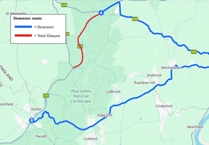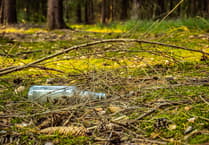Gritters are going out this week for the first significant operation of this winter season on motorways and major A-roads as temperatures dip across the country.
Whilst many have had to start scraping ice off their cars’ windscreen this morning, South Herefordshire and the Forest of Dean have not yet been hit with a yellow ice warning from the Met Office, as have some regions of England, Wales, and Scotland.
National Highways operates England’s 4,500-mile strategic road network. They are urging drivers to take care during the poor weather while also giving gritting teams space to operate.
The government-owned company switched over to autumn and winter operations on October 1, readying teams at 128 depots across the country to keep the country’s busiest roads open in the face of deteriorating weather.
This includes monitoring Met Office weather forecasts along with regular road assessments from meteorological experts DTN and MetDesk.
Caption: The National Highways winter fleet ready for action
With milder weather in October and November, minimal action was needed on our roads network with road surface temperatures staying above +1 degrees C – until now.
That has changed, with National Highways’ comprehensive forecasting services indicating road surfaces are at risk of developing ice in certain regions today – triggering the need for our gritter drivers in numerous areas to conduct their first salt spreading runs of the season.
A number of Met Office National Severe Weather Warnings have been issued as an arctic maritime airmass brings cold weather to the UK with a risk of ice, wintry showers and snow. In England there are yellow weather warnings for ice in North Cornwall and North Devon as well as along the East coast and northern England. Further severe weather warnings could be issued as we head through the week.
Essential advice for motorists this winter season
Darren Clark, Severe Weather Resilience Manager at National Highways, said: “We manage a huge roads network nationwide—with over 4,500 miles of motorways and A-roads.
“Not all roads will need treating on any given day. Gritters may need to go out in some regions if road temperatures fall below 1 degrees C, and if there is a risk of ice forming, but not in other areas if conditions are not as cold.”
Darren added: “I was out with a salting team one year in Strensham. I witnessed some motorists driving carelessly to try to avoid our vehicle – but in turn putting them, their passengers, us and other road users at risk.
“As our gritting teams go out more and more to spread salt on the roads this winter season, our message is simple to all road users: please be patient and give us the time and space to do what we need to do to keep you safe.
“If you are going to pass us, please do so courteously, pass us safely and legally, or even better, if you are able to stay back, you will actually help the salt on the road activate even more quickly by crushing and breaking it into the road surface which benefits everyone.
“It’s worth remembering too, we are not gritting all the time. Some of our fleet may come off at particular junctions or return to depots while other vehicles take over, lowering any inconvenience to motorists. We are once again totally committed to working around the clock on these seasonal operations to keep all road users safe and thank everyone in advance for their patience and understanding this autumn and winter season.”




Comments
This article has no comments yet. Be the first to leave a comment.